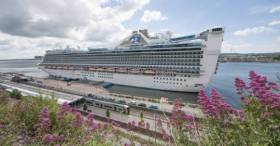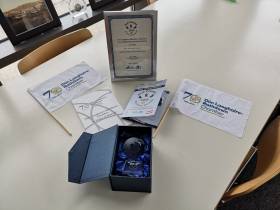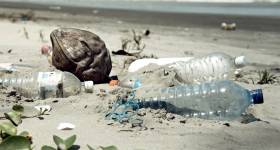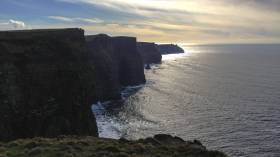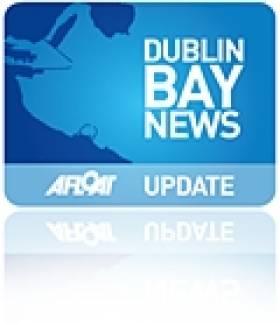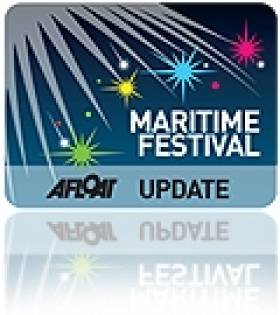Displaying items by tag: environment
Floating Nuclear Reactors & Reducing Shipping Carbon Emissions Theme of International Conference
The role of the marine environment in the push towards “net zero” carbon emissions is the theme of an international marine engineering conference running online later this month.
The challenges involved in using offshore wind energy and the feasibility of “floating nuclear reactors” to reduce emissions will also be discussed at a fortnight-long online conference opening later this month.
The conference from June 28th to July 9th is hosted by the Institute of Marine Engineering, Science and Technology (IMarEST) - an international body for marine engineering, science and technology professionals which has charitable status and is based in Britain.
Clean energy and transport in relation to ship-based research expeditions will be addressed by National Oceanography Centre associate director of national marine facilities Leigh Storey.
Setting a benchmark for decarbonising operations and maintenance vessels attached to offshore wind farms is the focus of a talk by economic analyst Dr Anthony Gray of ORE Catapult.
Using asset leasing models to encourage energy-saving technologies in reducing carbon emissions from shipping with be discussed by BMT naval engineer Nick Williams.
Soon Heng Lim, founder of the Society of Floating Solutions will focus on the controversial topic of floating nuclear plants – as in small modular reactors to reduce carbon emissions.
“We have an exceptional roster of speakers for this year’s annual conference, exploring many of the most pertinent subjects across marine engineering, science and technology,” IMarEst chief executive Gwynne Lewis said.
Attendees can register for the event via the IMarEST’s website here
Concerns on Environment Raised About Cruise Liners in Cobh, Cork Harbour
Concerns about the environment have been raised about cruise liners that dock in Cobh, Cork Harbour.
Local councillors were invited aboard one of the largest ships in the world, the ‘Norweigan Getaway’, by the Port of Cork to see how the ship operates.
However, one councillor told the EchoLive.ie, he “came away with an existential angst over the scale of the environmental problems we face.”
Green Party Cllr Alan O’Connor says he sees environmental concerns, both in the immediate effect such vessels have on Cobh and Cork Harbour, as well as the impact in terms of the worldwide large-scale effect of the industry.
Internationally there is growing concern about the environmental impact that cruise ships have.
By the end of 2019, according to Cllr O’Connor around 100 cruise liners will dock in the Port of Cork, with up to 110 expected in 2020. Those figures have been on the rise since 2014 when 53 cruise liners docked there, bringing more than 142,000 passengers and crew to Cork.
Cllr O’Connor acknowledges that many people's livelihoods depend on the tourists coming from the cruise liners, with many buses taking people to locations all across Cork including Blarney Castle, while others stay around the Cobh area.
“For Cobh, I got an estimated figure of €30,000 total spend by visitors from this boat,” he said. However, he’s questioned the sustainability of it: “At what stage must the environment come first?” he asked.
For further reading click here.
Dun Laoghaire Marina took home the Green Business Environment gong in the 2019 DLR County Business Awards, which took place this past Thursday night (3 October).
Speaking on the award, the marina commented on social media: “Wonderful to receive recognition for our efforts to reduce our impact on the environment and promote clean seas.”
Public Lecture On Marine Litter Tonight In Galway
‘Marine litter: are there solutions to this global environmental challenge?’ is the title of a free public lecture at 7pm tonight (Thursday 10 January) in the main concourse of GMIT’s main Galway campus.
Prof Richard Thompson from the School of Biological and Marine Sciences at Plymouth University will deliver the lecture ahead of the second Ecology and Evolution Ireland Conference at GMIT and NUI Galway this weekend.
Prof Thomson will discuss issues surrounding the widespread distribution of plastic debris at the sea surface, on the sea bed and on shorelines.
Nearly 700 marine wildlife species are known to encounter marine litter, with many reports of physical harm resulting from entanglement in and ingestion of plastic.
At the same time it is very clear that plastic items bring many societal benefits. Can these benefits be achieved without emissions of waste to the environment?
Progress requires systemic changes in the way we produce, use and dispose of plastic. Prof Thomson will suggest that a key solution to two major environmental problems, our non-sustainable use of fossil carbon (to produce plastics) and the accumulation waste, lies in recycling end-of-life plastics into new products.
While the two days of the conference on Friday 11 ad Saturday 12 January are now fully booked, attendance at this evening’s lecture is remains open and free to all.
Public Consultation On Ireland's Second Aarhus Convention Report
#Aarhus - Environment Minister Denis Naughten has launched the public consultation for a second implementation under the UN's Aarhus Convention on community participation in environmental issues.
Ratified in June 2012 after a long call by environmental and coastal community campaigners, the Convention on Access to Information, Public Participation in Decision-making and Access to Justice in Environmental Matters lays down a set of basic rules to promote citizens’ involvement in environmental matters and improve enforcement of environmental law.
Its provisions are broken down into three pillars: Access to Information on the Environment; Public Participation in Environmental Decision-making; and Access to Justice.
In what his department says is an effort to keep with the spirit of the convention, Minister Naughten has called on the public, including environmental NGOs, to submit comments on the implementation of the Aarhus Convention in Ireland prior to finalising Ireland's second National Implementation Report to the United Nations Economic Commission for Europe (UNECE).
The purpose of this consultation is to provide the UNECE as well as the Aarhus Convention Secretariat and Compliance Committee with the widest possible range of views and opinions on issues related to the implementation and promotion of the convention in Ireland.
The Department of Communications, Climate Action and Environment website has the draft report and details of the consultation, for which comments should be submitted no later than 5pm on Friday 28 October.
Galway Port Expansion To Go Ahead Under Habitats Directive
#GalwayPort - Business leaders have welcomed the news that the €126 million Galway Port extension project will be proceed under the IROPI section of the EU Habitats Directive.
According to the Galway Independent, the decision by An Bord Pleanála to proceed under IROPI – or Imperative Reasons of Overriding Public Interest – is a first for Ireland.
Progress will involve establishing replacement habitats for those that would be adversely affected by the port extension. As previously reported on Afloat.ie, it was determined that a number of reef, mud and sand habitats would be destroyed by the 24 hectares of land reclamation required.
But there's better news for those with environmental concerns, as planners have determined that two nearby Natura sites – the Inner Galway Bay Special Protection Are and the Lough Corrib Special Area of Conservation – will see no impact, while priority habitats at Lough Atalia and Renmore Loughs will not be "negatively affected".
The board has also recommended "tight co-operation" between the Galway Harbour Company and local authorities to ensure conservation is made top priority throughout the project.
The Galway Independent has more on the story HERE.
#DublinBay - "How many capital cities can boast such a rich marine megafauna?" asks the Irish Whale and Dolphin Group's Dr Simon Berrow.
It's an important question as Dublin last week celebrated 300 years of profound change since the decision to build the Great South Wall.
Along with the Bull Wall that followed in the 1800s, it was a project intended to solve dangerous silting in the main channel to Dublin Port.
But together, they completely reshaped the environment around Dublin Bay into a habitat for hundreds of species of marine wildlife - including the aforementioned megafauna like dolphins and porpoises that frequent Dublin's waters.
And it's an environment that's still reshaping today, as the Irish Independent reports - using the example of a toilet block built on Bull Island's Dollymount Strand in the early 1970s but which today, only 44 years on, is nestled deep in the dunes some distance from the beach.
Bull Island itself, which did not exist before the building of the Bull Wall two centuries ago, is now home to nine distinct habitats among the many important sites that round the bay from Howth's sea cliffs to Seapoint's rocky shoreline.
And its biosphere status is one that Dublin City Council wants to extent over an area from Malahide down to Killiney to ensure the bay's proper protection and management.
The Irish Independent has more on the story HERE.
Environmentalists Lack Confidence In NI To Regulate Fracking
#Fracking - Northern Ireland's inland and coastal waterways could be at risk from contamination by fracking activity, warns an environmental group.
The Belfast Telegraph reports on Friends of the Earth's poor assessment of Stormont's regulatory powers, with the group citing an array of illegal landfills and quarries across the North as a worrying precedent for any future fracking operations to extract shale gas.
In particular, FoE spoke out about licences for oil exploration granted for areas that cover wetlands, river catchments and marine zones - including Loughs Erne and Neagh, Belfast Lough and the Causeway Coast.
The Belfast Telegraph has more on the story HERE.
Clonshaugh Chosen For Fingal Sewage 'Super Plant'
#Sewage - Clonshaugh in North Dublin has been chosen as the location for the city's new water treatment 'super plant' which has long faced objections from local campaigners.
As The Irish Times reports, a meeting of Fingal County Council yesterday afternoon (10 June) saw the site near Dublin Airport chosen over Annsbrook and Newtowncorduff, both near the coastal towns of Rush and Lusk.
Part of the plan includes the construction of a 26km orbital sewer to collect waste from parts of Dublin, Kildare and Meath, and an outfall pipeline that will eject waste near Ireland's Eye.
Project managers have described the Clonshaugh option as "ecologically and environmentally better" than the alternatives, but campaigners such as Reclaim Fingal chair Brian Hosford argue that "the potential for environmental disaster [with a single large plant] is enormous".
In January 2012, Minister for Health James Reilly raised his own concerns that any potential malfunction at the large-scale facility - second-only in scale to the new water treatment plant at Ringsend - could see huge amounts of raw sewage pumped into the Irish Sea.
Meanwhile, The Irish Times also spoke to a farming family who may lose as many as 40 acres if the 'super plant' gets the go-ahead adjacent to their land.
"I would have to change my whole system of farming if this goes ahead," said 77-year-old PJ Jones, who added that his biggest concern was the smell.
Galway Expects Crowds For First Sea Festival
#Festivals - "Tens of thousands" of visitors are expected to flock to the City of the Tribes later this month for the first Galway Sea Festival over the June bank holiday weekend, according to the Galway Advertiser.
Dubbed the 'Mini-Volvo' by locals, the four-day event from 31 May till 3 June is hoped to recreate the celebratory atmosphere of last summer's successful Volvo Ocean Race finale, with a wide range of events both on and off the waters of Galway Bay.
Highlights include the festival regatta led by the Galway Bay Sailing Club's parades of sail on the Friday and Saturday evenings, and a traditional boat regatta by Badoiri na Cladaigh.
Watersports enthusiasts can get a taste of canoeing, diving, sea kayaking and windsurfing over the weekend, which also coincides with World Oceans Day - with family-friendly activities at the Galway Atlantaquaria on Sunday 2 June - and the International Canoe Polo Championships at Claddagh Basin.
Preceding the festival on Thursday 30 May will be the Bright Blue Sea Conference, a major international symposium on marine science, renewable energy, the environment and the 'blue economy'.
Last month it was reported that the Galway Sea Festival received the financial backing of Galway City Council, spurred by its aims to promote Galway as a maritime destination or commerce and tourism.
The Galway Advertiser has much more on the festival HERE.



























